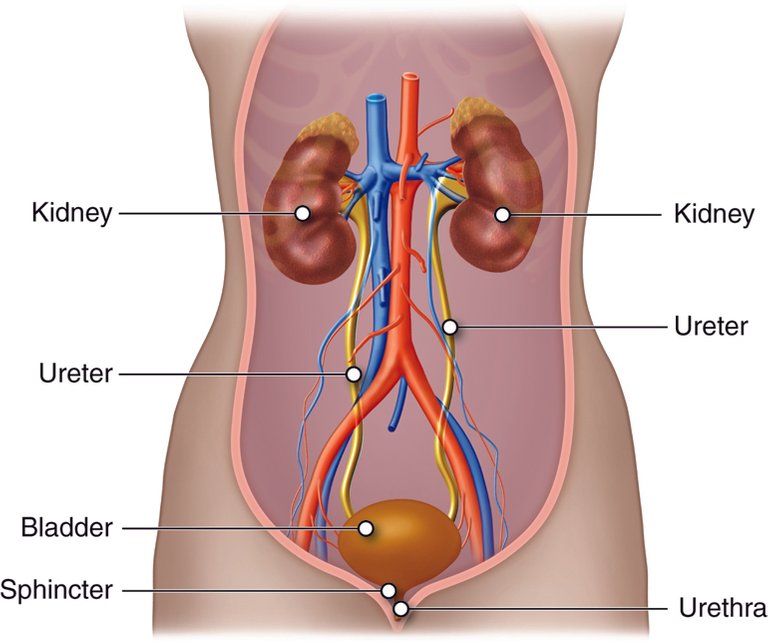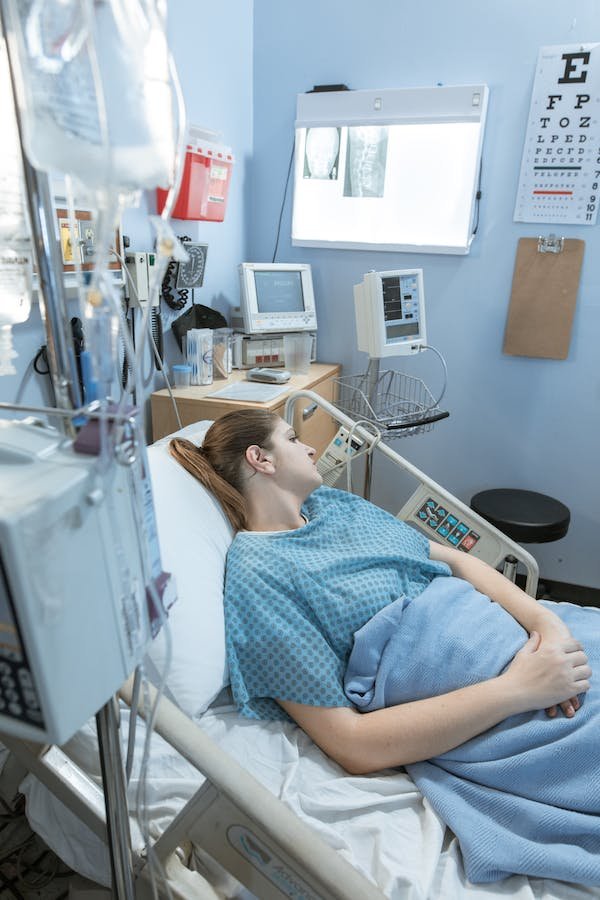The Strong Relationship between Kidney Infection and Urinary Tract Infection.
I was reading a story about a young man who was deeply in love and out of desperation to save the life of his dying girlfriend, he decided to sell one of his kidney's against the doctor's instruction to wait for a proper test before doing so, he felt that time was not on his side, so he spoke with a less experienced doctor who carried out the operation without many questions.
He was able to save his girlfriend and they both taught all was well until suddenly, he slumped one day while taking a walk on the street, he was rushed to the hospital and doctors confirmed that the other kidney he had left was infected. This is a serious case that needs urgent appropriate treatment. The question to be answered is;
- What is a kidney infection.
- How it can be identified.
- The possible treatment options for kidney infection.

pressbooks.ccconline.org
The major assignment of the kidney is to take out waste and extra water from the blood. Kidney infection is a type of urinary tract infection (UTI) that requires urgent medical treatment and if left untreated, it could lead to permanent damage to the kidneys. The infection is also called, Pyelonephritis, it would begin in the tube carrying urine from the urethra or in the bladder, it can also spread through the bloodstream causing deadly infections.
The urinary tract consists of;
- The bladder which stores urine.
- The urethra is the tube responsible for carrying urine from the bladder to the outer part of the body.
- We also have the kidneys, which function by cleaning waste from the blood and producing urine.
Kidney infection usually begins with a bladder infection spreading through the kidney, E.coli is a common type of bacteria that is usually associated with the infection, although, other types of bacteria could be associated with the symptom too. There is a possibility of having an infection get through the skin and make its way into the blood, traveling through the kidney, although this is a very rare occurrence it happens in very rare cases. A kidney infection can also be gotten after surgery, but this is also very rare.
What are the symptoms of Kidney Infection.
You begin to suspect the presence of kidney infections when these signs spring up;
- Stomach upset or vomiting.
- Fever.
- Pus or blood in the eye.
- Pain felt in the lower back, groin, or side.
- Confusion.
- Constant fatigue.
Those with bladder infections, the female gender, and pregnant women are at a higher chance of developing a kidney infection. Symptoms associated with bladder infections are; - Regular urge to urinate.
- Urine that smells really bad.
- Pain felt in the lower region of the stomach.
- Frequent urination.
- Burning sensation while urination.

pexels.com
How to prevent kidney infection.
Kidney infection is prevented best, by keeping the urethra and the bladder free from any type of bacteria, how possible could that be? Remember that, normally, bacteria are flushed out through the flow of urine. However, the existence of some health issues would stop the bacteria from being flushed out.
I mentioned earlier that kidney infection is more common in the female gender, this is because a female's urethra is shorter than that of the male, with this difference in length, it is easier for viruses and bacteria to get into the woman's urethra. Once this happens, it becomes a shorter trip to the bladder, and from the bladder, it becomes more convenient to spread to the kidneys.
It is easier for pregnant women to become victims of the infection as a result of hormonal changes, as the growing baby places pressure on the mother's bladder and slows down the flow of urine. Asides from being a female and being pregnant, basically, anything that disrupts urine from flowing as it should, could increase your chances of getting a kidney infection, some of the issues that can come are;
Any condition that prevents the bladder from getting completely empty.
Blockage in the urinary tract like an enlarged prostate and a kidney stone.
A weak immune system: Those who have HIV or AIDS, diabetes, or people who take medications that suppress the immune system.
Damage to the spinal cord: When the spinal cord is damaged or damage is done to the nerve of the bladder, the signs of urinary tract infection would not be noticed, leading to kidney infection.
Prostrate infection.
When there is an issue with the shape of the urinary tract.
The kidney can however be kept safe, ensuring the urethra and the bladder is free from any form of infection, when these steps are followed, it would do a lot of good;
- Consume lots of fluid, basically water.
- Whenever you feel the need to use the toilet, ensure to do so rather than holding it in.
- Ensure to wash your genitals on a daily basis, especially before sex.
- Constipation can increase your chances of having a UTI, treat constipation as soon as you can.
- If you know that you are prone to UTI, avoid condoms that are coated in spermicide.
To determine the presence of kidney infection, medical experts would carry out tests such as;
Urine analysis which would check for the presence of pus, blood, and bacteria in the urine.
Urine culture as well, which is to test for the type of bacteria affecting the urine.
Ultrasound or CT scan could be used to determine the presence of a blockage in the urinary tract.
Voiding cystourethrogram (VCUG), this is a form of x-ray used to figure out the presence of any issue bladder or urethra
If you continue to get urine infections, helpful antibiotics would be prescribed to help lower the chances of having an infection.
Digital rectal exam often for the male gender, with this method, the doctor inserts a lubricated finger into your anus to help detect any form of swollen prostate.
Dimercaptosuccinc acid scintigraphy (DMSA), this method makes use of a radioactive material to detect the presence of kidney infection.
Kidney infection has to be treated instantly as that is the only possible way to prevent the possible complications that comes along with it.
Damage to the kidney: When a kidney is infected, the possibility of the bacteria spreading to other parts of the body is very high, the kidney could also become scarred, resulting in high blood pressure, serious chronic disease and even kidney failure.
Septicemia: This is when blood poisioning occurs, at this point the bacteria from an infected kidney gets into the blood and then spreads through the body into other organs, this requires an urgent medical condition.
Pregnancy complications: When a pregnant woman has kidney infection, the chances of giving birth to a premature or a low-weight baby is high, although kidney complications can also happen in the process.
If discovered early, kidney infections can be treated, usually with antibiotics which would take about a week or two, there should be a relief felt after few days of taking the medications, ensure to finish the medications even if you feel relieved. In a case where the symptoms are severe, you may have to stay a few days in the hospital. In a case where the kidney infection gets treated and continues to re-ccur, then it may be as a result of a problem you have with the structure of your urinary tract, in this case, your doctor may recommend you to a specialist.
Conclusion.
Kidney infection would not neccessarily result in kidney removal if found on time, in some cases it could be treated with medications and in other cases, it may take longer periods of being admitted in the hospital. Most cases of kidney infection occur as a result of an underlying urinary tract infection (UTI), the most significant way to handle kidney infection, is to go for treatment once any of the symptoms are figured out.
Urinary tract infections are true medical emergencies, it should not be treated at home, it should be treated especially the first days via intravenous, with treatments that somehow are already in protocol, do cultures, renal ultrasound is also important to know which is the specific bacteria.
Bed rest is essential the first days, drinking water, balanced diet, there are many aspects to consider, but you have given very valid information here in your post, thank you.
Most people make the mistake of treating UTIs with over-the-counter medications when medical help should be sort as soon as discovered, appreciate your response friend.
Thanks for your contribution to the STEMsocial community. Feel free to join us on discord to get to know the rest of us!
Please consider delegating to the @stemsocial account (85% of the curation rewards are returned).
Thanks for including @stemsocial as a beneficiary, which gives you stronger support.